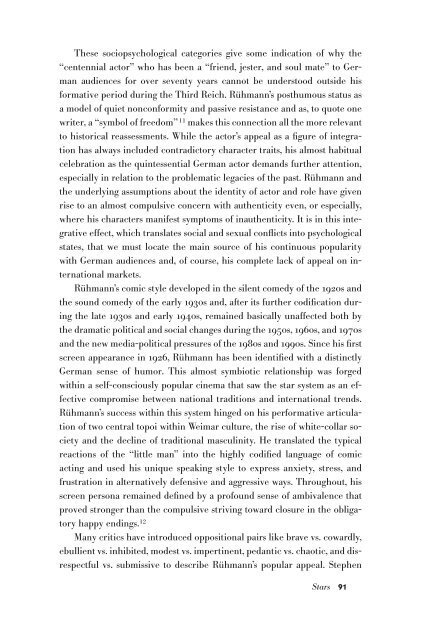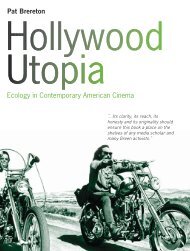Create successful ePaper yourself
Turn your PDF publications into a flip-book with our unique Google optimized e-Paper software.
These sociopsychological categories give some indication of why the<br />
“centennial actor” who has been a “friend, jester, and soul mate” to German<br />
audiences for over seventy years cannot be understood outside his<br />
formative period during the Third Reich. Rühmann’s posthumous status as<br />
a model of quiet nonconformity and passive resistance and as, to quote one<br />
writer, a “symbol of freedom” 11 makes this connection all the more relevant<br />
to historical reassessments. While the actor’s appeal as a figure of integration<br />
has always included contradictory character traits, his almost habitual<br />
celebration as the quintessential German actor demands further attention,<br />
especially in relation to the problematic legacies of the past. Rühmann and<br />
the underlying assumptions about the identity of actor and role have given<br />
rise to an almost compulsive concern with authenticity even, or especially,<br />
where his characters manifest symptoms of inauthenticity. It is in this integrative<br />
effect, which translates social and sexual conflicts into psychological<br />
states, that we must locate the main source of his continuous popularity<br />
with German audiences and, of course, his complete lack of appeal on international<br />
markets.<br />
Rühmann’s comic style developed in the silent comedy of the 1920s and<br />
the sound comedy of the early 1930s and, after its further codification during<br />
the late 1930s and early 1940s, remained basically unaffected both by<br />
the dramatic political and social changes during the 1950s, 1960s, and 1970s<br />
and the new media-political pressures of the 1980s and 1990s. Since his first<br />
screen appearance in 1926, Rühmann has been identified with a distinctly<br />
German sense of humor. This almost symbiotic relationship was forged<br />
within a self-consciously popular cinema that saw the star system as an effective<br />
compromise between national traditions and international trends.<br />
Rühmann’s success within this system hinged on his performative articulation<br />
of two central topoi within Weimar culture, the rise of white-collar society<br />
and the decline of traditional masculinity. He translated the typical<br />
reactions of the “little man” into the highly codified language of comic<br />
acting and used his unique speaking style to express anxiety, stress, and<br />
frustration in alternatively defensive and aggressive ways. Throughout, his<br />
screen persona remained defined by a profound sense of ambivalence that<br />
proved stronger than the compulsive striving toward closure in the obligatory<br />
happy endings. 12<br />
Many critics have introduced oppositional pairs like brave vs. cowardly,<br />
ebullient vs. inhibited, modest vs. impertinent, pedantic vs. chaotic, and disrespectful<br />
vs. submissive to describe Rühmann’s popular appeal. Stephen<br />
Stars 91

















